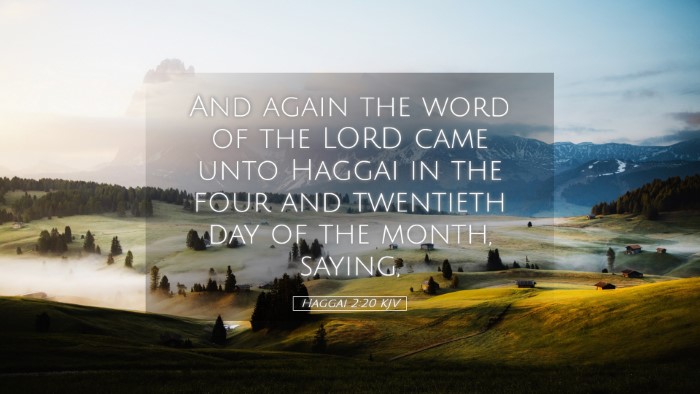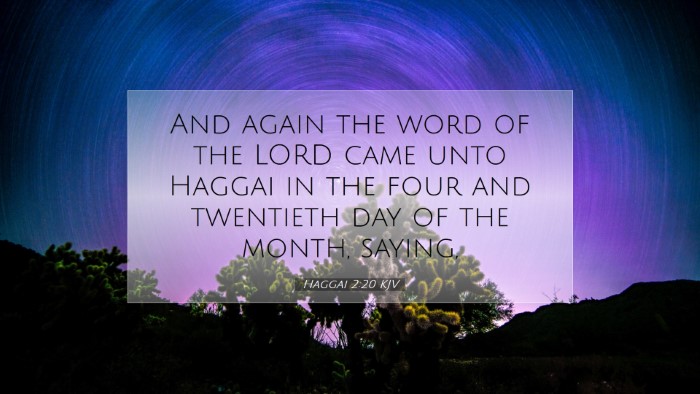Old Testament
Genesis Exodus Leviticus Numbers Deuteronomy Joshua Judges Ruth 1 Samuel 2 Samuel 1 Kings 2 Kings 1 Chronicles 2 Chronicles Ezra Nehemiah Esther Job Psalms Proverbs Ecclesiastes Song of Solomon Isaiah Jeremiah Lamentations Ezekiel Daniel Hosea Joel Amos Obadiah Jonah Micah Nahum Habakkuk Zephaniah Haggai Zechariah MalachiHaggai 2:20
Haggai 2:20 KJV
And again the word of the LORD came unto Haggai in the four and twentieth day of the month, saying,
Haggai 2:20 Bible Commentary
Commentary on Haggai 2:20
Introduction
Haggai 2:20 serves as a crucial passage within the book of Haggai, representing a significant moment in the prophetic dialogue concerning the restoration of the Jewish people after their exile. This verse is placed in the final chapter of the book and connects the overarching themes of hope, future restoration, and divine promise. Influential commentaries such as those by Matthew Henry, Albert Barnes, and Adam Clarke provide profound insights into the implications of this verse, which can be beneficial for pastors, students, theologians, and scholars.
Text of Haggai 2:20
"And the word of the Lord came to Haggai a second time on the twenty-fourth day of the month: "
Contextual Background
The context of Haggai’s prophecy is vital for understanding the intent and purpose behind the message. This passage occurs during the time of the rebuilding of the temple in Jerusalem, which had been left in ruins. The people of Judah were encouraged to consider their current state and their responsibilities towards God and His house. Earlier in the book, Haggai emphasized the importance of prioritizing God's work and encouraged the people to be strong and committed to the task at hand.
Divine Communication
This verse marks the second occasion that God speaks to Haggai, indicating a continued engagement with His prophet. Matthew Henry's commentary highlights that such frequent communication signifies God's active involvement in the affairs of His people. It demonstrates His concern for their spiritual welfare and His desire to guide them in rebuilding not just the temple but also their relationship with Him.
Significance of Timing
Indentified as occurring on the twenty-fourth day of the month, this date is significant. Albert Barnes notes that the specificity of the timing underlines God’s meticulous plan. Notably, Haggai’s prophecies fall shortly after the people had resumed work on the temple, and God's reaffirmation at this point serves to bolster their morale and resolve.
Theological Implications
Restoration and Hope:Haggai 2:20 speaks to the broader theme of restoration that permeates the book. By emphasizing God's readiness to communicate, this verse reassures the people that their efforts to restore the temple will not go unnoticed or unrewarded. Adam Clarke comments on the significance of hope during times of spiritual revival, suggesting that this divine reassurance would uplift the people's spirits and encourage their faith in the future.
God’s Sovereignty:This verse also reflects God's sovereignty over history and human affairs. He is not distant but rather intimately involved in guiding and correcting His people. The implications of divine sovereignty suggest that the restoration of the temple is part of a larger divine narrative, and the willingness of God to communicate His intentions should inspire reverence and trust among the people.
The Means of Revelation
Haggai receives communication from God, which Matthew Henry highlights as a privilege. This revelation is both a means of instruction and a tool for reformation. The prophets are not merely messengers but pivotal figures through whom God shapes the conscience and destiny of His people. The consistent communication from God reflects His desire for a covenant relationship where His people turn to Him and seek His guidance.
Application for Today
Encouragement to Leaders:For pastors and church leaders, Haggai 2:20 serves as a testament to the importance of seeking divine guidance in leadership. The communication that Haggai received should encourage leaders today to remain attentive to God’s voice, especially in moments of transition and rebuilding within their congregations.
Inspiration for Believers:Believers are reminded that God is actively involved in their lives and that He desires to communicate with them. The assurance that God speaks to His people can bring peace and assurance in times of trial or uncertainty. This reassurance can inspire creativity and action in the service of God’s kingdom, just as it did for the exiles returning to Jerusalem.
Conclusion
In summary, Haggai 2:20 encapsulates significant theological and practical truths for the contemporary church. Through the commentaries of Matthew Henry, Albert Barnes, and Adam Clarke, we are reminded of God’s relentless desire to interact with His people. The context and implications of this verse encourage faith in divine promises, the recognition of God’s sovereignty, and the importance of leadership rooted in divine guidance.


